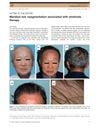 8 citations,
June 2019 in “Scientific Reports”
8 citations,
June 2019 in “Scientific Reports” Increased PPARGC1α relates to hair thinning in common baldness.

Newer retinoid drugs are effective for skin conditions but have significant side effects.
 9 citations,
July 2016 in “The Journal of Dermatology”
9 citations,
July 2016 in “The Journal of Dermatology” An 82-year-old man's white hair regained color after taking etretinate for psoriasis.
 7 citations,
August 2009 in “The Journal of Rheumatology Supplement”
7 citations,
August 2009 in “The Journal of Rheumatology Supplement” Retinoids and narrowband UVB phototherapy are effective for treating psoriasis and can reduce treatment time when used together.
 30 citations,
January 2009 in “Nuclear Receptor Signaling”
30 citations,
January 2009 in “Nuclear Receptor Signaling” Hairless protein is crucial for healthy skin and hair, and its malfunction can cause hair loss.
 28 citations,
July 2007 in “Development”
28 citations,
July 2007 in “Development” TAF4 is important for skin cell growth and helps prevent skin cancer in mice.
 204 citations,
February 2000 in “Current Medicinal Chemistry”
204 citations,
February 2000 in “Current Medicinal Chemistry” Antiandrogens like flutamide are effective in treating conditions like prostate cancer and hair loss, but there's a need for more potent versions. Understanding their structure can help develop better treatments.
 131 citations,
August 2000 in “International Journal of Dermatology”
131 citations,
August 2000 in “International Journal of Dermatology” Inflammation may be linked to hair loss, and targeting specific enzymes could help treat it.
 115 citations,
August 2008 in “The Journal of Clinical Endocrinology & Metabolism”
115 citations,
August 2008 in “The Journal of Clinical Endocrinology & Metabolism” Thyroid hormones help hair grow, reduce hair loss, and increase hair pigment.
 77 citations,
July 2020 in “Journal of the European Academy of Dermatology and Venereology”
77 citations,
July 2020 in “Journal of the European Academy of Dermatology and Venereology” Environmental factors, hormones, nutrition, and stress all significantly affect skin health and aging.

research Acne
58 citations,
January 1997 in “Dermatologic Clinics” Acne significantly affects mental health and quality of life, with research suggesting hormonal and genetic factors in its development and emphasizing early treatment to prevent scarring.
 51 citations,
January 2003 in “Hormone Research in Paediatrics”
51 citations,
January 2003 in “Hormone Research in Paediatrics” Hormones and their receptors, especially androgens, play a key role in hair growth and disorders like baldness.
 39 citations,
May 2011 in “Human Immunology”
39 citations,
May 2011 in “Human Immunology” Genetics play a role in acne, but how exactly they contribute is not fully understood.
 28 citations,
October 2019 in “Seminars in Cell & Developmental Biology”
28 citations,
October 2019 in “Seminars in Cell & Developmental Biology” Hair can regrow in large wounds through a process similar to how hair forms in embryos, and understanding this could lead to new treatments for hair loss or scarring.
 20 citations,
September 2005 in “Endocrinology”
20 citations,
September 2005 in “Endocrinology” Certain changes to the B-ring of androgen receptor ligands can increase their effectiveness for potential treatments of muscle and bone conditions.
 13 citations,
November 2013 in “Journal of Endocrinology/Journal of endocrinology”
13 citations,
November 2013 in “Journal of Endocrinology/Journal of endocrinology” Vitamin D receptor helps control hair growth genes in skin cells.
 6 citations,
June 2021 in “Developmental biology”
6 citations,
June 2021 in “Developmental biology” Dermal EZH2 controls skin cell development and hair growth in mice.
 6 citations,
January 2010 in “Springer eBooks”
6 citations,
January 2010 in “Springer eBooks” SA linked to mitochondrial issues and oxidative stress, while AGA involves disrupted hair growth genes.
 5 citations,
March 2019 in “Experimental dermatology”
5 citations,
March 2019 in “Experimental dermatology” Activating TLR3 may help produce retinoic acid, important for tissue regeneration.
 2 citations,
December 2018 in “Journal of cosmetic dermatology”
2 citations,
December 2018 in “Journal of cosmetic dermatology” Higher CRBP1 levels are linked to more severe alopecia areata.
 2 citations,
January 2011 in “Elsevier eBooks”
2 citations,
January 2011 in “Elsevier eBooks” Early treatment of acne is crucial to prevent scarring and psychological effects.
 1 citations,
September 2016 in “Springer eBooks”
1 citations,
September 2016 in “Springer eBooks” Sebum production varies by individual and is influenced by age, gender, and hormones, affecting skin and hair health.
 1 citations,
January 2013 in “Springer eBooks”
1 citations,
January 2013 in “Springer eBooks” Cosmeceuticals may benefit skin health but need more research for efficacy and safety confirmation.

Isotretinoin may cause temporary, reversible facial hair growth in some women.
 September 2021 in “International Journal of Biomedicine”
September 2021 in “International Journal of Biomedicine” Certain gene variations are linked to a higher risk of severe acne, suggesting a genetic influence on the condition.
 November 2020 in “bioRxiv (Cold Spring Harbor Laboratory)”
November 2020 in “bioRxiv (Cold Spring Harbor Laboratory)” Ezh2 controls skin development by balancing signals for dermal and epidermal growth.
 November 2020 in “bioRxiv (Cold Spring Harbor Laboratory)”
November 2020 in “bioRxiv (Cold Spring Harbor Laboratory)” Dermal EZH2 controls skin cell growth and differentiation in mice.
 December 2015 in “Journal of Psoriasis and Psoriatic Arthritis”
December 2015 in “Journal of Psoriasis and Psoriatic Arthritis” A patient experienced long-lasting hair loss after using acitretin for psoriasis.
 January 2006 in “Advances in developmental biology”
January 2006 in “Advances in developmental biology” The Hairless gene is crucial for healthy skin and hair growth.
35 citations,
January 2018 in “Vitamins and hormones” DHEA affects various tissues by interacting with multiple receptors and can be converted into sex hormones.





























